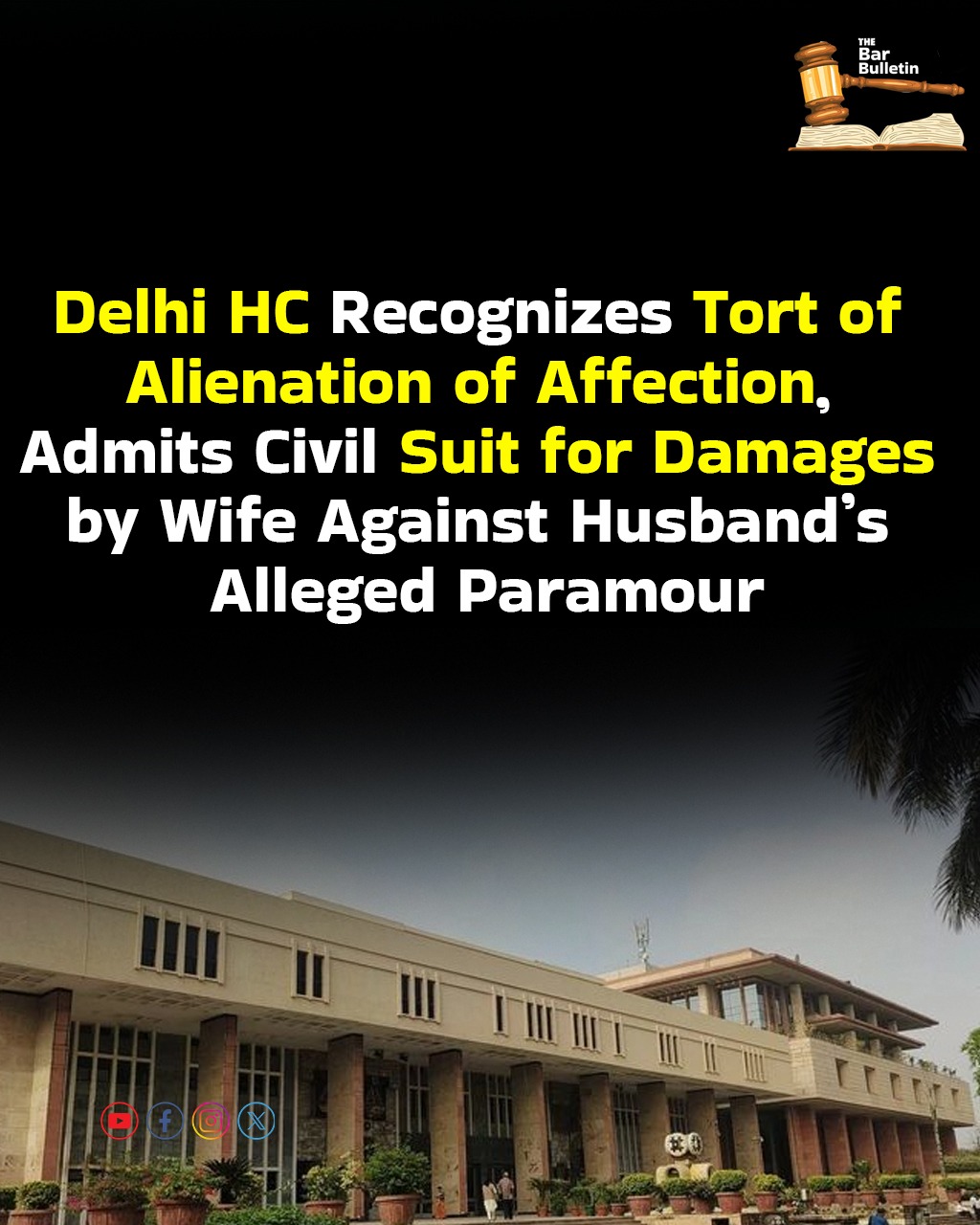The Delhi High Court allowed the plaintiff’s suit against her husband’s lover to proceed, holding that a tort action for Alienation of Affection (AoA) is maintainable in Indian civil courts, and not barred by family court or procedural law.
The plaintiff filed a civil suit against her husband’s alleged lover (Defendant No. 1), claiming the latter intentionally destroyed her marriage, and sought damages for loss of companionship and emotional harm.
The plaintiff married her husband in 2012 and the couple have twin children. Defendant no. 1 joined the family business as an analyst in 2021, developed a close relationship with the husband, and allegedly became his exclusive companion. By 2023, the affair was discovered by the plaintiff and family, which purportedly led to marital breakdown. The husband filed for divorce, prompting the plaintiff to file the present suit.
Upon institution of the suit, the defendants raised objections to the maintainability, arguing:
(i) Family Court had exclusive jurisdiction for disputes “arising out of a marital relationship” under Section 7 of the Family Courts Act, 1984
(ii) Indian law doesn’t recognize AoA
(iii) Actions between private consenting adults cannot be made actionable
The plaintiff argued that she had suffered a legal injury through intentional tortious conduct of Defendant no. 1, and Indian law does not bar a civil claim for such interference.
The Bench comprising Justice Purushaindra Kumar Kaurav, after analysing domestic and comparative law precedents, explained that while Indian statutes do not codify AoA, the common law concept is judicially acknowledged by prior Supreme Court and High Court cases. The claim, grounded in tort law and not matrimonial law per se, is distinct and maintainable in ordinary civil courts.
The Court cited precedents like Pinakin Mahipatray Rawal v. State of Gujarat[1] and Indra Sarma v. V.K.V. Sarma[2], noting that Indian courts have acknowledged AoA as a possible tort, subject to strict evidence of intentional and wrongful interference.
It distinguished actions in Family Courts from those pursuing civil damages against third parties and held that such a civil action is neither expressly barred by Section 9 CPC nor falls within the exclusive domain of Family Courts unless the claim is wholly founded on the marital relationship itself.
The court also addressed and refuted arguments about personal liberty and the Joseph Shine v. Union of India judgment, clarifying that decriminalization of adultery does not preclude civil consequences.
In result, the Court directed registration of the plaint, issued summons to the defendants, and set timelines for pleadings and evidentiary steps. While reserving all rights for the defense to move to reject the plaint at a later stage under Order VII Rule 11 CPC, the Court held that, at the threshold, the plaint disclosed a legally sustainable cause of action for AoA, distinct from matrimonial or family court jurisdiction.
Cases referred to:
1. Margaret Angel v. State Rep. by the Inspector of Police, O.P.(MD) No. 15407 of 2016, dated 05.10.2018
2. Pinakin Mahipatray Rawal v. State of Gujarat, (2013) 10 SCC 48
3. Indra Sarma v. V.K.V. Sarma, (2013) 15 SCC 755
4. Joseph Shine v. Union of India, 2019 (3) SCC 39
5. Devendra Kumar v. Manita, 2017 SCC OnLine Utt 866
6. Karuppusami v. Indira, 2019 SCC OnLine Mad 29805
7. Geeta Anand v. Tanya Arjun, 2024 SCC OnLine Del 2327
8. Avneet Kaur v. Sadhu Singh, 2022 SCC OnLine Del 4815
9. Manita Khurana v. Indra Khurana, 2010 SCC OnLine Del 225
10. Meena Kapoor v. Ayushi Rawal, 2020 SCC OnLine Del 2481
Appearances:
Ms. Malavika Rajkotia, counsel for the plaintiff (wife).
Mr. K.C. Jain, counsel for defendant no.1,
Mr. Prabhjit Jauhar counsel for defendant no.2 (husband).
[1] (2013) 10 SCC 48
[2] (2013) 15 SCC 755

